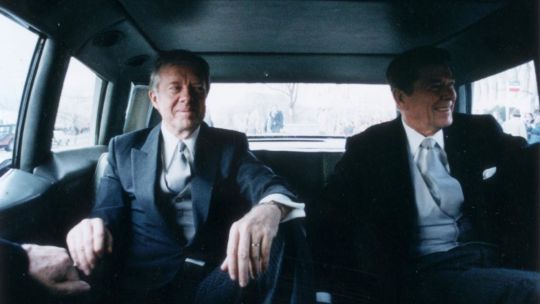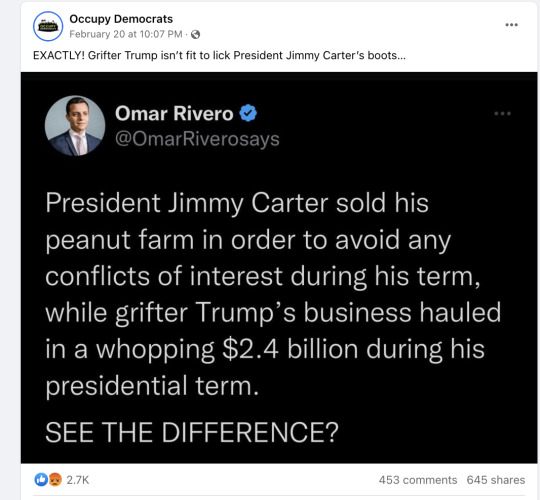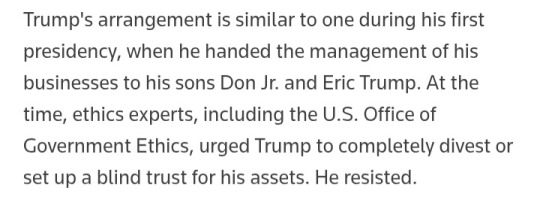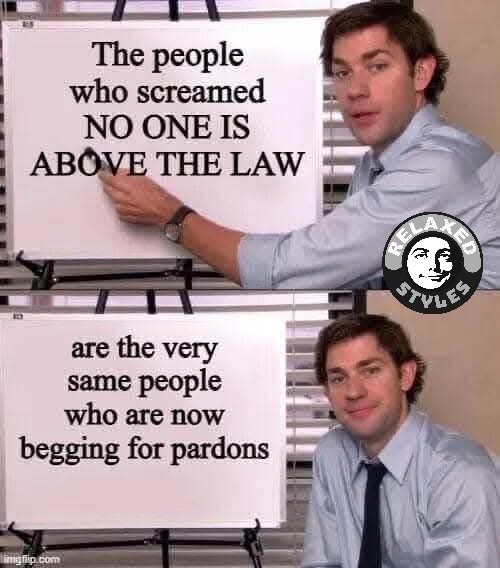#Carter administration
Explore tagged Tumblr posts
Text

"It hurt to lose to Ronald Reagan. But after the election, I tried to make the transition as smooth as possible. Later, from my experience in trying to brief him on matters of supreme importance, I was very disturbed at his lack of interest. The issues were the 15 or 20 most important subjects that I as President could possibly pass on to him. His only reaction of substance was to express admiration for the political circumstances in South Korea that let President Park close all the colleges and draft all the demonstrators. That was the only issue on which he came alive."
-- Former President Jimmy Carter, on losing the 1980 election and the transition leading to the inauguration of Ronald Reagan, interview with TIME Magazine, October 11, 1982.
#History#Presidents#Jimmy Carter#President Carter#Carter Administration#Ronald Reagan#President Reagan#Reagan Administration#1980 Election#Presidential History#Presidency#Presidential Elections#Presidential Transitions#Inauguration of Ronald Reagan#Presidential Rivals#Presidential Rivalries#Presidential Relationships#Quotes#Presidential Quotes#Quotes by Presidents#Presidents on Presidents#Politics#Political History
10K notes
·
View notes
Text
NewsNation:
(NewsNation) — The longest-lived U.S. president in history, Jimmy Carter, has died at the age of 100. Carter, who served as the 39th president of the United States from 1977 to 1981, died Sunday in Plains, Georgia. At 100, Carter was the third-oldest living person to have served as a state leader. He had been receiving hospice care since February 2023. The Carter Center confirmed his death via X.
“My father was a hero, not only to me but to everyone who believes in peace, human rights, and unselfish love,” said Chip Carter, the former president’s son. “My brothers, sister, and I shared him with the rest of the world through these common beliefs. The world is our family because of the way he brought people together, and we thank you for honoring his memory by continuing to live these shared beliefs.” Presidential historian and friend of Carter’s, Dr. Larry Cook, remembered Carter as a gracious and caring man guided by his faith and values. “He’s let it be known that his faith has guided him since he was a child and up through his adult life and through the presidency and beyond,” Cook said. “It’s who he is, his faith is who he is.” Carter was preceded in death by his wife, Rosalynn Carter, who died Nov. 19, 2023. The former president and first lady had the longest marriage of any first couple in U.S. history and celebrated their 77th wedding anniversary in July 2023.
39th President Jimmy Carter passed away at 100. Carter holds the record of longest-lived US President in history. His wife Rosalynn died last year.
RIP to a fine Christian man who rightly called out the atrocity that Israel Apartheid is. 🇺🇸 🇵🇸
From the 12.29.2024 edition of NewsNation's NewsNation Now:
youtube
35 notes
·
View notes
Text
The White House had solar panels for 7 years:
On June 20, 1979, the Carter administration installed 32 panels designed to harvest the sun's rays and use them to heat water…[Carter predicted at the dedication ceremony], “A generation from now, this solar heater can either be a curiosity, a museum piece, an example of a road not taken or it can be just a small part of one of the greatest and most exciting adventures ever undertaken by the American people."
By 1986, the Reagan administration had gutted the research and development budgets for renewable energy at the then-fledgling U.S. Department of Energy (DoE) and eliminated tax breaks for the deployment of wind turbines and solar technologies…
And in 1986 the Reagan administration quietly dismantled the White House solar panel installation while resurfacing the roof. "Hey! That system is working. Why don't you keep it?" recalls mechanical engineer Fred Morse, now of Abengoa Solar, who helped install the original solar panels as director of the solar energy program during the Carter years and then watched as they were dismantled during his tenure in the same job under Reagan.
138 notes
·
View notes
Text
A “(Pr)eulogy”: President Carter and the Antisemitic Corruption of U.S. Policy
Carter may not have been the first president hostile toward Jews or Israel; but his was the first administration to allow that hostility to seriously skew policy to the self-inflicted detriment of America and its allies. This column originally appeared in the Daily Caller (under a different title). Continue reading A “(Pr)eulogy”: President Carter and the Antisemitic Corruption of U.S. Policy
View On WordPress
#andrew young#antisemitism#Arafat#Biden#carter#carter administration#corruption#Foreign policy#golda meir#james bill#Jimmy Carter#khomeini#khomeinism#khomeinist#menachem begin#middle east policy#Obama#shah#william sullivan#wreath#Yitzhak Rabin
1 note
·
View note
Link
God bless you, Jimmy. You were the definition of a decent human.
By Kai Bird
Mr. Bird is the director of the Leon Levy Center for Biography and the author of “The Outlier: The Unfinished Presidency of Jimmy Carter.”
Sign up for the Opinion Today newsletter Get expert analysis of the news and a guide to the big ideas shaping the world every weekday morning. Get it sent to your inbox.
The man was not what you think. He was tough. He was extremely intimidating. Jimmy Carter was probably the most intelligent, hard-working and decent man to have occupied the Oval Office in the 20th century.
When I was regularly interviewing him a few years ago, he was in his early 90s yet was still rising with the dawn and getting to work early. I once saw him conduct a meeting at 7 a.m. at the Carter Center where he spent 40 minutes pacing back and forth onstage, explaining the details of his program to wipe out Guinea worm disease. He was relentless. Later that day he gave me, his biographer, exactly 50 minutes to talk about his White House years. Those bright blue eyes bore into me with an alarming intensity. But he was clearly more interested in the Guinea worms.
Mr. Carter remains the most misunderstood president of the last century. A Southern liberal, he knew racism was the nation’s original sin. He was a progressive on the issue of race, declaring in his first address as Georgia’s governor, in 1971, that “the time for racial discrimination is over,” to the extreme discomfort of many Americans, including his fellow Southerners. And yet, as someone who had grown up barefoot in the red soil of Archery, a tiny hamlet in South Georgia, he was steeped in a culture that had known defeat and occupation. This made him a pragmatist.
The gonzo journalist Hunter Thompson once described Mr. Carter as one of the “meanest men” he had ever met. Mr. Thompson meant ruthless and ambitious and determined to win power — first the Georgia governorship and then the presidency. A post-Watergate, post-Vietnam War era of disillusionment with the notion of American exceptionalism was the perfect window of opportunity for a man who ran his campaign largely on the issue of born-again religiosity and personal integrity. “I’ll never lie to you,” he said repeatedly on the campaign trail, to which his longtime lawyer Charlie Kirbo quipped that he was going to “lose the liar vote.” Improbably, Mr. Carter won the White House in 1976.
He decided to use power righteously, ignore politics and do the right thing. He was, in fact, a fan of the establishment’s favorite Protestant theologian, Reinhold Niebuhr, who wrote, “It is the sad duty of politics to establish justice in a sinful world.” Mr. Carter was a Niebuhrian Southern Baptist, a church of one, a true outlier. He “thought politics was sinful,” said his vice president, Walter Mondale. “The worst thing you could say to Carter if you wanted him to do something was that it was politically the best thing to do.” Mr. Carter routinely rejected astute advice from his wife, Rosalynn, and others to postpone politically costly initiatives, like the Panama Canal treaties, to his second term.
His presidency is remembered, simplistically, as a failure, yet it was more consequential than most recall. He delivered the Camp David peace accords between Egypt and Israel, the SALT II arms control agreement, normalization of diplomatic and trade relations with China and immigration reform. He made the principle of human rights a cornerstone of U.S. foreign policy, planting the seeds for the unraveling of the Cold War in Eastern Europe and Russia.
He deregulated the airline industry, paving the way for middle-class Americans to fly for the first time in large numbers, and he regulated natural gas, laying the groundwork for our current energy independence. He worked to require seatbelts or airbags, which would go on to save 9,000 American lives each year. He inaugurated the nation’s investment in research on solar energy and was one of the first presidents to warn us about the dangers of climate change. He rammed through the Alaska Land Act, tripling the size of the nation’s protected wilderness areas. His deregulation of the home-brewing industry opened the door to America’s thriving boutique beer industry. He appointed more African Americans, Hispanics and women to the federal bench, substantially increasing their numbers.
But some of his controversial decisions, at home and abroad, were just as consequential. He took Egypt off the battlefield for Israel, but he always insisted that Israel was also obligated to suspend building new settlements in the West Bank and allow the Palestinians a measure of self-rule. Over the decades, he would argue that the settlements had become a roadblock to a two-state solution and a peaceful resolution of the conflict. He was not afraid to warn everyone that Israel was taking a wrong turn on the road to apartheid. Sadly, some critics injudiciously concluded that he was being anti-Israel or worse.
In the aftermath of the Iranian revolution, Mr. Carter rightly resisted for many months the lobbying of Henry Kissinger, David Rockefeller and his own national security adviser, Zbigniew Brzezinski, to give the deposed shah political asylum. Mr. Carter feared that to do so would inflame Iranian passions and endanger our embassy in Tehran. He was right. Just days after he reluctantly acceded and the shah checked into a New York hospital, our embassy was seized. The 444-day hostage crisis severely wounded his presidency.
But Mr. Carter refused to order any military retaliations against the rogue regime in Tehran. That would have been the politically easy thing to do, but he also knew it would endanger the lives of the hostages. Diplomacy, he insisted, would work. And yet now we have good evidence that Ronald Reagan’s campaign manager Bill Casey made a secret trip to Madrid in the summer of 1980, where he may have met with a representative of Ayatollah Ruhollah Khomeini and thus prolonged the hostage crisis. If this is true, such interference in the hostage negotiations sought to deny the Carter administration an October surprise, a release of the hostages late in the campaign, and it was dirty politics and a raw deal for the American hostages.
Mr. Carter’s presidency was virtually scandal free. He often spent 12 hours or more in the Oval Office reading 200 pages of memos a day. He was intent on doing the right thing and right away.
But there were political consequences to such righteousness. In 1976, while he won the electoral votes of the South and the union, Jewish and Black popular votes, by 1980, the only large margin Mr. Carter sustained was among Black voters. Even evangelicals deserted him because he had insisted on stripping tax-exempt status from all-white religious academies.
The majority of the country rejected him as a president way ahead of his time: too much of a Georgian Yankee for the New South and too much of an outlier populist for the North. If the election in 1976 offered hope for a healing of the racial divide, his defeat signaled that the country was reverting to a conservative era of harsh partisanship. It was a tragic narrative familiar to any Southerner.
Mr. Carter’s loss of a second term momentarily plunged him into depression. But then one night, in January 1982, Mrs. Carter was startled to see him sitting up in bed, wide-awake. She asked him if he was feeling ill. “I know what we can do,” he replied. “We can develop a place to help people who want to resolve disputes.” This was the beginning of the Carter Center, an institution devoted to conflict resolution, public health initiatives and election monitoring around the world.
If I once believed that Mr. Carter was the only president to use the White House as a steppingstone to greater things, I see now that the past 43 years have really been an extension of what he thought of as his unfinished presidency. In or out of the White House, Mr. Carter devoted his life to solving problems, like an engineer, by paying attention to the minutiae of a complicated world. He once told me that he hoped to outlive the last Guinea worm. Last year there were only 13 cases of Guinea worm disease in humans. He may have succeeded.
#politics#jimmy carter#carter administration#american history#hostage crisis#american embassy#oval office#President
255 notes
·
View notes
Text

↑ This seems to be where the misinformation came from, so here is the truth ↓

To be fair to occupy democrats they fixed the incorrect information on the original post. But obviously, the damage has been done, and misinformation has been spread on tiktok
Presidents are always supposed to put their businesses into a blind trust in order to have no conflict of interest. Something Donald Trump sorta did in his first term ↓

https://www.reuters.com/business/trump-will-separate-himself-family-business-wsj-reports-2025-01-10/
But reportedly

Also....
#tiktok#donald trump#fuck trump#trump#us politics#president trump#trump administration#us presidents#jimmy carter#president jimmy carter#us government#trump is a threat to democracy#trump is the enemy of the people#trump is a criminal
412 notes
·
View notes
Text

#fox news#donald j. trump#kamala harris#democrats#donald trump#trump#president trump#dan bongino#pardon#joe biden#biden administration#hunter biden#president biden#biden#government corruption#corruption kink#ukraine#ukrainian tumblr#zelensky#wuhan#covid 19#anti vaxxers#bill gates#vaccine#the fed#nancy pelosi#bill clinton#hillary clinton#the clintons#jimmy carter
206 notes
·
View notes
Text

Jimmy Carter
[ID: Tf2 comic panel of Zepheniah Mann's dead, decrepit body hooked up to the Administrator's machine. She caresses his cheek with one hand. End ID]
#tf2#team fortress 2#tf2 comics#the days have worn away#zepheniah mann#admin#administrator tf2#jimmy carter
75 notes
·
View notes
Text
———He was successful in bringing these two countries away from the Soviet Union, but he brought countries together, like Egypt and Israel. He brought Egyptian President Anwar Sadat and Israeli Prime Minister Menachem Begin together to negotiate peace between the two countries. He brought them together at Camp David in Maryland, and this event is known as the Camp David Accords. He successfully got the leaders of Israel and Egypt to sign a peace treaty (Hixson), which ended nearly 31 years of hostility between the two countries (“Carter the Unstoppable Peace Machine”). He stilled issues between many countries, even inside certain countries, or in this example, continents. Latin America went from primarily authoritarian to mostly democratic within ten years after Carter’s presidency. He is credited with moving countries to democracy, as many countries were inspired by Jimmy Carter's acts (Alter & Bird). He promoted democracy in Africa, Latin America, and other places. He signed The Panama Canal Treaty in 1977, which returned control of the Canal in Panama in 1999 after being controlled by America since 1903 (Peterson). Carter is known for his many foreign policies and relations, most of which had a great impact on an international level. In 1980, his presidency ended when Ronald Reagan defeated him.
Jimmy Carter was also known for his substantial use of energy and protection of land during his time in office. His legacy regarding energy and the environment will not be forgotten. He was the president who put solar panels on the White House to create and conserve energy. He was a strong believer in climate change, even though it was not formally addressed until 35 years later in the Paris Agreement. Carter designated over 50 million acres of wilderness in Alaska as federally protected. He later signed the Alaska Lands Act, which protected and doubled the size of the national parks system (Bullard & Hurley). He signed the law that created the Environment Protection Agency’s Superfund program to clean up toxic spills and waste, specifically in Love Canal, a neighborhood between Niagara Falls and New York. The EPA has been used since then to clean toxic waste and debris from various issues. Carter called for renewable energy to make up 20% of America’s energy mix, but that goal has still not been met. He issued a report about global warming that asked countries to limit their temperature rises to 2 Celsius above pre-industrial levels. He asked for this 35 years before the Paris Agreement, which defines and creates demands about climate change. In the 1977 address, Carter urged America to start thinking of the future of the land and energy when he said, “[W]e must start now to develop the new, unconventional sources of energy we will rely on in the next century,” (Bullard & Hurley). He was an important figure talking about energy reliance and the issues regarding energy consumption. Many people are inclined to listen to important figures and they took his warning in with great consideration. Carter cared for future generations and explained the potential issues that could occur in the future. Another important issue was his agreement with nuclear energy. In 1979, he went to a malfunctioned nuclear reactor in Pennsylvania to put the public at ease. Since he supported nuclear energy as a common source of energy, he needed to show the public that it was safe. Since he worked with nuclear technology in his earlier years, he had no difficulty providing reasons that nuclear energy would be beneficial. He later went to a plant in Canada to assess the situation and shut it down, which he did. Carter stated that he would protect the environment, for he “... will not permit America to be forced to choose between breathing foul air and having our waters filthy on the one hand or mortgaging our future to the OPEC oil cartel” (Bullard & Hurley). He passed acts like the “Powerplant and Industrial Fuel Use Act of 1978 and the Public Utility Regulatory Policies Act of 1978”, both of which promoted domestic and renewable energy (Bullard & Hurley). The former, however, also prohibited the use of oil or gas in any newer generators. Carter later oversaw the creation of the US Department of Energy. The US Department of Energy has spent millions of dollars researching energy and developing new, sustainable ways of using power (Bullard & Hurley). After his presidency ended, his environmental and energy acts stayed in place.
After his presidency, he spent his days doing humanitarian work. He was set on improving the lives of others in whatever way he could. One way he did this was through the eradication of Guinea Worm disease, which had killed millions of people in Africa (“Carter the Unstoppable Peace Machine”). Guinea Worm disease had been killing people in Africa but is now the second human disease to be eradicated after smallpox. Two years after his presidency ended, in 1982, he founded the Carter Center, a nonprofit that addressed national and international issues regarding public policy. The Carter Center has since mitigated conflicts in Africa, Latin America, Asia, and the Middle East since then (Peterson). For example, he prevented issues between North and South Korea. In 1994, he sealed a nuclear disagreement between North Korea and South Korea, which prevented war between the two countries (“Carter the Unstoppable Peace Machine”). He met with the leaders of the two countries to find an agreement that both parties could agree on. He stopped violence between North and South Korea, which is significant considering the historic issues between the two countries. He then worked as a religious educator in his hometown and traveled the world on humanitarian missions. He set off to improve worldwide living conditions, along with fighting inequality and injustice. Along with these missions, he and his family were involved in the Habitat for Humanity project to assist impoverished families in building a lasting home. In his time after his presidency, he helped build houses in 14 countries and 21 states (Ball). In 2002, to recognize his international public service and dedication to democracy, human rights, socio-economic development, and ending conflicts, he received the Nobel Peace Prize (Peterson).
In summary, Jimmy Carter is a famous American with notable achievements in politics and humanitarianism. He is remembered for his foreign policy and relations, human rights promotion, and talks of renewable, resourceful energy. His policies and programs are currently still active. The EPA, which he created, has recently cleaned up spaces near Palestine after the continuous destruction in the country (Bullard & Hurley). The Carter Center is still active as of 2025 and encourages peace throughout the world. He spent the majority of his days helping the general public in many ways. Carter was the influence behind some countries moving to democracy, specifically in Latin America and in Africa. His legacy carries on today through his acts of humanitarianism. His presidency was one of no war, no political unrest, and of working for the people (Brinkley). Carter passed away on December 29, 2024. He is remembered most for his peace effects and his accomplishments after his presidency. He was a strong member fighting for equality and basic human rights. Jimmy Carter achieved many great things, both as a president and as an individual.
Works Cited
Alter, J.; Bird, K. The Surprising Greatness of Jimmy Carter. Washington Monthly, [s. l.], v. 53, n. 11/12, p. 35–49, 2021. Disponível em: https://research.ebsco.com/linkprocessor/plink?id=e47a0cc4-826d-3059-a9ed-35ccfd8b1 a8a. Acesso em: 10 fev. 2025.
B., Petersen, Jennifer. “Jimmy Carter.” Jimmy Carter (Great Neck Publishing), Jan. 2021, p. 1–N.PAG. EBSCOhost, research.ebsco.com/linkprocessor/plink?id=dad69461-a18d-3b67-bb7b-623373a72759.
Ball, Molly. “Former President Jimmy Carter Is Still Building His Legacy, One Home at a Time.” TIME Magazine, vol. 192, no. 12, Sept. 2018, pp. 16–17. EBSCOhost, research.ebsco.com/linkprocessor/plink?id=3025b43d-3442-3436-b61b-ae28bd0a86b7.
Brinkley, Douglas. “The Rising Stock of Jimmy Carter: The `hands-on’ Legacy of Our Thirty-Ninth President.” Diplomatic History, vol. 20, no. 4, Sept. 1996, p. 505. EBSCOhost, https://doi.org/10.1111/j.1467-7709.1996.tb00285.x.
Bullard, Nathaniel, and Amanda Kolson Hurley. “Jimmy Carter’s Presidency Was Defined by Energy.” Bloomberg.Com, Feb. 2023, p. N.PAG. EBSCOhost, research.ebsco.com/linkprocessor/plink?id=86401d87-a1be-3abb-b1e1-6e434559f7b7.
“Carter the Unstoppable Peace Machine.” Sun, The, Dec. 2024, p. 16. EBSCOhost, research.ebsco.com/linkprocessor/plink?id=728286fe-08c8-3000-9126-a54b19862f94.
HIXSON, W. L. et al. President Jimmy Carter’s Legacy. Washington Report on Middle East Affairs, [s. l.], v. 42, n. 3, p. 8–14, 2023. Disponível em: https://research.ebsco.com/linkprocessor/plink?id=60fc6c1c-1d1d-33be-b7c0-c3a25ededc1 7. Acesso em: 10 fev. 2025.
Hoffmann, Stanley. “Carter’s Soviet Problem.” New Republic, vol. 179, no. 5, July 1978, pp. 20–23. EBSCOhost, research.ebsco.com/linkprocessor/plink?id=e40f8638-903f-3e3a-996f-7ce3dd1085ec.
Tyszkiewicz, Jakub. “Human Rights and the Jimmy Carter Administration’s Policy towards Poland, 1977–80.” Cold War History, vol. 23, no. 2, May 2023, pp. 307–25. EBSCOhost, https://doi.org/10.1080/14682745.2022.2102606.
shocked i can type this much haha but here’s my essay
jimmy carter could’ve done so much more if he only had time 💔
he was such an amazing person. after his presidency, he did so many wonderful things for the world around him and he genuinely improved millions of people. some americans dislike him because he ‘didn’t do much’ as president, but they don’t realize he actually tried to do so much, but congress wouldn’t pass anything. i wrote a 10 page essay on great accomplishments he had. he was a good guy. rest in peace.
#jimmy carter#carter#president#president carter#carter administration#my opinion#james earl carter jr
5 notes
·
View notes
Note
I’m curious about the friendship between Gerald Ford and Jimmy Carter (and presidential friendships in general,) I’d like to know what that looked like for them. Would they go and do things together or was it just a few phone calls a year?
Their relationship is really interesting because during the 1976 campaign and in the years right afterward, Ford and Carter genuinely did not like each other. It wasn't a normal, opponent vs. opponent rivalry, either. They straight-up disliked one another, and that was extremely unusual for Gerald Ford, who got along with practically everybody he met throughout his life, rarely had bad things to say about other people, and was almost physically incapable of being unkind to others, no matter what side of the political spectrum they belonged to.
What changed was when President Reagan sent all the living former Presidents -- Nixon, Ford, and Carter -- to Cairo in 1981 to attend Anwar Sadat's funeral following Sadat's assassination. The three former Presidents all flew together on one of the planes normally used as Air Force One, and there was some tension at the beginning, but the person who broke the ice, oddly enough, ended up being Richard Nixon. Ford then suggested that the former Presidents should drop all formalities and just refer to one another as Dick, Jerry, and Jimmy. As Ford remembered, "I guess we figured we were gonna be in a plane together forty hours, more or less, and in order to be pleasant, it was a good idea to just wipe the slate clean, which we did." Ford and Carter eventually started bonding, partly over the fact that Ronald Reagan was a major reason why each of them ultimately lost their respective bids for re-election.
At the time, Carter was having trouble building his Presidential Library, and he asked Ford for some advice since Ford had just recently opened his library. When Carter mentioned he was having some issues raising money for the library, Ford offered to come down and appear at fundraisers for him, and asked Carter to return the favor and visit the Ford Library for an event.
As Thomas M. DeFrank writes in his 2007 book, Write It When I'm Gone: Remarkable Off-the-Record Conversations With Gerald R. Ford (BOOK | KINDLE | AUDIO):
"Carter accepted, triggering a Jimmy-Jerry tag team match extending over several years. These back-scratching appearances didn't convert them into friends, but the relationship was notably friendlier. They began staying in regular contact, talking on the phone, and exchanging birthday greetings. Their contacts were sufficiently public that some of Ford's closest political allies grumbled that he was spending altogether too much time with Carter -- not unlike similar complaints from [George H.W.] Bush 41 partisans today that he hangs around Bill Clinton too much. Ford brushed off the complaints. Beyond their shared practical interests in Presidential Libraries, another unifying bond was at play. Both ex-Presidents had strong reasons not to like Ronald Reagan, which helped cement their ties even though neither one would ever admit it publicly. To one old Ford friend, the calculation was simple: 'Once you did something for his library or museum, you were a friend for life.'"
As they got older, Ford and Carter would sometimes make joint appearances at Presidential Libraries or universities, or events for important causes, and they even wrote a joint op-ed during the Monica Lewinsky scandal urging Congress to censure President Clinton instead of impeaching him. They felt it was a bad precedent (which it has clearly turned out to be) and would be bad for the country. Unlike Ford, Jimmy Carter wasn't very easy-going or personable, so there were times when their friendship would get a little frayed. Ford once told a friend, "Well, you know Jimmy. He can be a real pain in the ass, but we get along."
Eventually, they promised one another that they would deliver the eulogy if the other former President died first. President Ford died first, on December 26, 2006, and Carter attended every event during the several days of ceremonies, from Ford's lying in state at the U.S. Capitol, to the national funeral service at the Washington National Cathedral, and traveled with Ford's family and the former President's remains to Ford's hometown of Grand Rapids, Michigan. At the church service in Grand Rapids, Carter delivered his eulogy, and also attended the private interment service when Ford was buried as at his Presidential Library. In his eulogy, Carter repeated the gracious first words he had said when delivering his Inaugural Address on the day he took over the White House from Ford in 1977, "For myself and for my nation, I want to thank my predecessor for all he has done to heal our land." It was a remarkable relationship between two former Presidents who, again, genuinely disliked one another for quite some time.
#History#Presidents#Presidential History#Gerald R. Ford#President Ford#Ford Administration#Gerald Ford#Jimmy Carter#President Carter#Carter Administration#Presidential Rivals#Presidential Friendships#Presidential Relationships#Presidential Frenemies#Funeral of Gerald Ford#Death of Gerald Ford#Thomas M. DeFrank#Write It When I'm Gone#Write It When I'm Gone: Remarkable Off-the-Record Conversations with Gerald R. Ford#1976 Election#Inauguration of Jimmy Carter#Election of 1976#Presidency
108 notes
·
View notes
Text
Honestly I did mostly pay attention in high school history, but I’m honestly not sure what all we learned. On account of being thirty-three now and having learned things from a lot of other sources at this point.
#we definitely got to the carter administration#I wrote an essay about malaise. I think I got a B on it
6 notes
·
View notes
Link
President Biden traveled to Los Angeles to meet with Governor Gavin Newsom to announce the federal government disaster relief efforts will remain dedicated to the recovery and rebuilding process long after his term ends
#Janet Walker#Haute-Lifestyle.com#The-Entertainment-Zone.com#Beltway Insider#biden administration#Jimmy Carter#LA Fires#trump sentencing#gavin newsom#FEMA#Greenland#Oil#rare earth elements#mountain pass#china
1 note
·
View note
Text
NASA Administrator Pays Tribute to President Carter
The following is a statement from NASA Administrator Bill Nelson on Sunday’s passing of President Jimmy Carter: “President Carter was the pinnacle of a public servant, dedicating his life to making our world a better place. He showed us each and every person has the power to make a difference. From providing for those in need, protecting […] from NASA https://ift.tt/DhGJ6Qk
0 notes
Note
Is it true that bill clinton was a night owl and also had a really bad temper?
Oh yeah, President Clinton had a legendarily volcanic temper. There have even been moments in interviews or speeches where he gets annoyed and you'll see a flash of anger in his eyes, his face turns bright red, and he starts pointing his finger at whomever he's speaking with. Some of his former White House aides have written about his temper over the years and said it never lasted very long, but was pretty intense when it happened, and the only thing more uncomfortable was when he would get really mad at someone and he'd give them an icy stare and silent treatment. In his book All Too Human: A Political Education (BOOK | KINDLE | AUDIO), George Stephanopoulos, who was a senior staff member in the White House during most of Clinton's first term wrote:
"When Hillary was angry, you didn't always know it right away -- a calculated chill would descend over time. [President] Clinton's anger was a more impersonal physical force, like a tornado. The tantrum would form in an instant and exhaust itself in a violent rush. Whoever happened to be in the way would have to deal with it; more often than not, that person was me. I guess Clinton figured that I could fix whatever problem was causing his frustration, and he must have sensed that I didn't take his temper personally. The trick was to have a kind of thin skin -- to understand that Clinton's didn't really yell at you; he yelled through you, as the rage passed through him. My job was to absorb the anger and address its cause."
You can see some hints of Clinton's volatile temper in this 2004 interview with Peter Jennings, this tense back-and-forth with Jerry Brown during a 1992 Democratic Presidential primary debate, and, most famously, throughout the deposition he gave to independent counsel Kenneth Starr regarding his affair with Monica Lewinsky.
Believe it or not, another relatively recent President who had an explosive temper was Jimmy Carter. There are quite a few stories about Carter's icy glare and silent treatment when angry, as well as a borderline mean-spirited form of sarcasm when he was really pissed off. In his excellent biography, His Very Best: Jimmy Carter, A Life (BOOK | KINDLE | AUDIO), author Jonathan Alter wrote:
"Carter enjoyed oddballs but rarely suffered fools. His staff got used to the 'tells' of his annoyance or anger. A vein in his temple throbbed, and his jaw moved. Then came an uncomfortable silence and a stare from his 'icy blues,' enough to make one hide under his desk even though the Governor [Carter] never raised his voice. 'He can curl your hair when he wants to chew you out,' his close friend Bert Lance wrote. 'And he'll flash those eyes at you so brightly you'll need sunglasses.'"
#History#Presidents#Presidency#Presidential History#Presidential Personalities#Bill Clinton#President Clinton#All Too Human: A Political Education#Clinton Administration#George Stephanopoulos#Jonathan Alter#His Very Best: Jimmy Carter-A Life#Jimmy Carter#President Carter#Carter Administration#Presidential Temperament
30 notes
·
View notes
Text
Allie Weintraub and Caitlin Yilek at CBS News:
Washington — President Biden is awarding the Presidential Medal of Freedom, the nation's highest civilian honor, to Hillary Clinton and 18 others "who have made America a better place," the White House announced Saturday. Clinton, who served as first lady, senator, secretary of state, and was the first woman to be nominated for president by a major political party, "made history many times over decades in public service," the announcement said.
Other recipients include actors Michael J. Fox and Denzel Washington, U2 frontman Bono, Inter Miami soccer star Lionel Messi and billionaire philanthropist George Soros. Those receiving the award posthumously are former Attorney General Robert F. Kennedy, civil rights leader Fannie Lou Hamer, former Defense Secretary Ash Carter and former Michigan Gov. George W. Romney.
Mr. Biden is also honoring ethologist and conservationist Dr. Jane Goodall, retired Los Angeles Lakers legend Magic Johnson, chef and World Central Kitchen founder José Andrés, fashion designer Ralph Lauren, Vogue editor-in-chief Anna Wintour, science educator Bill Nye "The Science Guy," LGBTQ activist and entrepreneur Tim Gill, billionaire philanthropist David Rubenstein and American Film Institute founder George Stevens Jr. Several of the recipients are longtime donors to Biden and the Democratic Party.
President Biden handed out Presidential Medal of Freedom honors to Hillary Clinton, George Soros, Bill Nye, Lionel Messi, Magic Johnson, Fannie Lou Hamer, Michael J. Fox, and Bono, just to name some.
#Presidential Medal Of Freedom#Joe Biden#Biden Administration#Hillary Clinton#Lionel Messi#George Soros#Bono#Michael J. Fox#Bill Nye#Fannie Lou Hamer#Magic Johnson#José Andrés#Ashton Carter#George Romney#Tim Gill#Anna Wintour#Robert F. Kennedy#Denzel Washington
12 notes
·
View notes
Text

help
0 notes